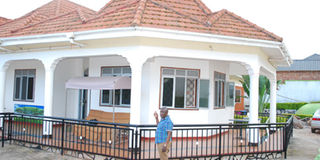Dauda built his empire from scratch

Magnificient. Dauda Ntanda explains how he built the hotel from scratch. PHOTOS BY BRIAN MUGENYI
The first thing that strikes you when you meet Dauda Ntanda is his sharp business acumen.
Ntanda, 41, has risen from earning a commission of about Shs1m a month selling cereals and grains such as maize, beans and coffee to become a successful businessman in the hotel industry in the greater Masaka region.
His hotel businesses are fast closing in on Shs692 million mark in worth, which he realised from saving most of his monthly commission and loans from relatives.
His road to entrepreneurial success has been long and winding, starting out as a labourer for a group of businessmen selling produce in Masaka.
Starting
With the knowledge from the businessmen, Ntanda decided to venture into the cereal trade. In 2014, he had saved about Shs60m. That was enough capital to start a business. He started buying and selling cereals and grains to major towns including Kampala.
He would buy beans, coffee and maize as a middleman and sell at a profit to final consumers. Truth be told, hotel business requires one to save for the long run and earn profits in a long run. It demands patience. “In business, the best way to start is to start,” Ntanda asserts.
“I always wanted to be a successful businessman,” says Ntanda, who is also the owner of Smart-Delight supermarket which started in 2016 with a capital of Shs200m in Masaka town.
“I denied myself all pleasure and saved most of my earnings from 2010 to 2015. That is when I started buying land to construct the hotel,” says Ntanda.
Determination
“I had this feeling that I could succeed. The money started coming in. I would earn double. This is how I knew I could do much better with higher capital investment,” says Ntanda.
Hotel business
Armed with some big cash, Ntanda started buying land in Masaka for his hotel venture.
Without hesitation, he is quick like a wink to say; in 2015, he started by buying 42 decimals, approximately, one acre piece of land, along Kyotera road.
After buying the land, Ntanda started hotel construction. “My friend, it started as a small house, small as it goes,” says Ntanda. He named it White Havens hotel.
And for the fact, that he lives a business oriented life, he went on to save money day and night in order to expand the facility into a hotel.
And yes, today, he relishes to his goal and words. The hotel has 35 self-contained rooms.
“There were unexploited opportunities. Competition was not very high. Today I charge between Shs102,000 and Shs350,000 per visitor for an overnight stay at the hotel,’ he says. His venture also benefits from the weekly gig dubbed the Friday corporate night.
“Friday night is the best, we receive very many guests who come here to enjoy,” he says.
The hotel is set in a quiet, serene location and has self-contained rooms, and a picnic site. These attract tourists and honeymooners.
Income grows
As his income grew, he began saving in a bank. Later, he decided to diversify. In 2016 he invested Shs200m in supermarket business.
Late 2016, Ntanda was named among the regional suppliers of Operation Wealth Creation (OWC).
This became a good platform to launch his agribusiness venture.
He started supplying OWC with orange, mango and coffee seedlings. Ntanda says on average he earns Shs100m from this venture.
Advice
He challenges young people in the region, which is mainly dependent on coffee and banana farming, to start their own firms.
“The bottom line of going to school is to live a good life later on. A good life requires money and good money can be found only in business. As an employee, you will never make more money than your employer. You can only do that if you go into business and become your own boss,” he says.
Challenges
On his never-to-ending list of challenges; Ntanda says; exorbitant water bills and electricity at one point discouraged him.
“Water consumption in hotel business is always high. But there times where the bills even go beyond your calculations, and you can’t limit the customer,” he shares. “With electricity, maybe I am planning to install solar energy,” says Ntanda.




